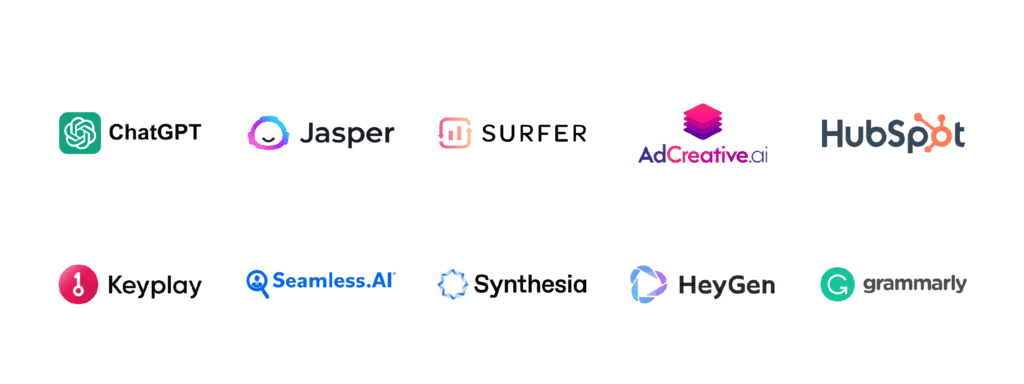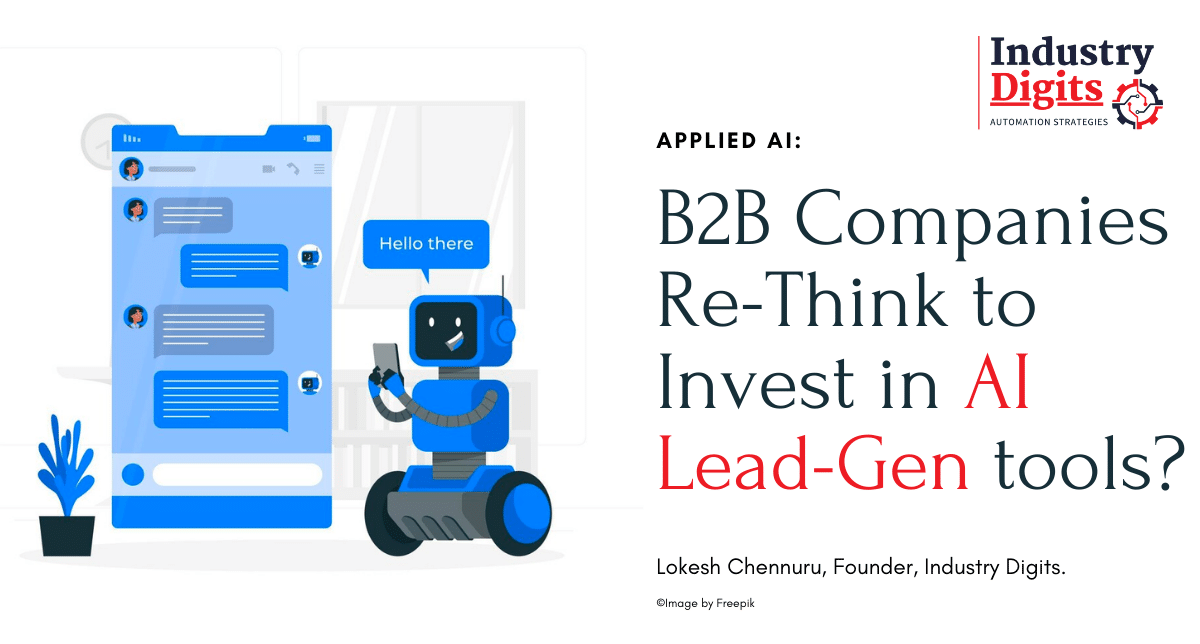How Growth Systems For B2B reduces human error in business processes
Transform Your Service: Just How AI Automation Is Changing B2B Operations
AI automation is improving B2B operations in substantial methods. Firms are embracing this modern technology to simplify operations and enhance effectiveness. As tasks become automated, services can focus on tactical development instead than ordinary processes. The effects of these adjustments are extensive, influencing whatever from customer interactions to supply chain administration. Recognizing this change is vital, as the future of organization joints on the effective assimilation of AI right into everyday operations. What exists in advance in this evolving landscape?
Recognizing AI Automation in B2B Context
As organizations progressively look for efficiency, recognizing AI automation within the B2B context becomes important. AI automation refers to the application of fabricated intelligence innovations to enhance and improve organization processes. In B2B environments, this can show up in various types, such as automating data entrance, enhancing supply chain logistics, or boosting supply monitoring. Organizations leveraging AI automation can reduce operational costs, decrease human error, and increase performance. AI tools can assess substantial quantities of data to give actionable understandings, allowing educated decision-making. The combination of AI into B2B procedures not just transforms typical operations however additionally cultivates dexterity and scalability, allowing organizations to adapt to market changes promptly and successfully. Accepting this innovation is essential for remaining affordable in today's electronic landscape
Enhancing Client Experience With AI
How can AI transform consumer communications in the B2B sector? AI improves customer experience by providing individualized, prompt, and reliable service. Online aides and intelligent chatbots can manage inquiries 24/7, making sure customers receive prompt feedbacks. Growth Systems For B2B. Anticipating analytics make it possible for organizations to prepare for customer needs, tailoring offerings appropriately. AI-driven systems can examine consumer information, allowing for targeted advertising and marketing techniques and boosted engagement. Additionally, view analysis devices assess client comments, aiding organizations tweak their solutions. By automating regular jobs, AI releases up human resources to focus on high-value interactions, cultivating stronger connections. The assimilation of AI not just improves communication however also builds trust fund and commitment, inevitably elevating the total customer experience in the affordable B2B landscape

Simplifying Supply Chain Administration With AI
AI plays an important duty in maximizing supply chain management with predictive analytics and automated inventory control. By leveraging anticipating analytics, services can anticipate demand changes and readjust their operations as necessary. Automated inventory systems even more improve efficiency by making certain stock degrees are maintained, decreasing waste and improving general productivity.
Predictive Analytics Benefits
While several businesses face challenges in managing intricate supply chains, predictive analytics provides a transformative solution by leveraging huge amounts of data to anticipate patterns and enhance operations. By evaluating historic information together with real-time inputs, anticipating analytics makes it possible for companies to determine patterns and prepare for future demands. This foresight permits more informed decision-making, boosting effectiveness and minimizing costs. On top of that, organizations can proactively attend to possible disturbances by anticipating supply chain bottlenecks and adjusting techniques accordingly. The assimilation of predictive analytics not just enhances supply administration yet additionally cultivates stronger partnerships with distributors and customers through prompt feedbacks to market changes. Eventually, the adoption of predictive analytics equips companies to remain competitive in an increasingly vibrant organization environment.
Automated Stock Control
As services significantly count on predictive analytics to optimize supply chain procedures, automated inventory control emerges as a powerful ally in this initiative. By leveraging AI-driven technologies, companies can enhance accuracy in stock tracking, decrease stockouts, and minimize excess stock. Automated systems evaluate real-time information, permitting businesses to forecast demand fluctuations and change supply degrees accordingly. This not just improves order fulfillment however also enhances capital monitoring by decreasing holding expenses. Furthermore, AI can determine patterns in purchasing habits, making it possible for even more informed decision-making regarding distributor relationships and procurement strategies. Ultimately, automated stock control not just improves functional effectiveness however likewise improves customer complete satisfaction by making certain item schedule, strengthening its function as an essential part in modern supply chain management.
Data-Driven Choice Making Powered by AI
In today's competitive landscape, organizations progressively rely upon data-driven decision-making to enhance functional performance and calculated planning. Expert system plays a crucial function in this makeover by assessing huge quantities of information quickly and properly. AI formulas identify patterns, patterns, and abnormalities that human experts could ignore, allowing companies to make educated decisions based upon real-time understandings. This ability allows companies to anticipate market shifts, optimize source allocation, and customize their offerings to client demands. Additionally, AI-driven analytics help with threat assessment and administration, making sure that companies can browse uncertainties efficiently. By leveraging these innovative devices, companies not just enhance their decision-making procedures yet likewise gain a competitive benefit in their corresponding markets, cultivating growth and development.
Automating Repeated Jobs to Increase Productivity

Integrating AI With Existing Organization Procedures
Lots of organizations encounter obstacles when incorporating AI with existing service procedures. These difficulties typically stem from an absence of recognizing relating to exactly how AI can enhance existing process. Effective combination needs an extensive assessment of existing operations to determine locations where AI can add value. Organizations needs to additionally guarantee that their teams are geared up with the necessary skills to leverage AI tools properly. Furthermore, smooth integration rests on the compatibility of AI modern technologies with legacy systems. Firms usually find it beneficial to adopt a phased approach, piloting AI applications in specific divisions prior to a wider rollout. This technique permits changes based on preliminary feedback, ensuring smoother changes and making the most of the potential benefits of AI automation in enhancing efficiency and efficiency.
Future Fads in AI Automation for B2B Companies
As B2B business want to the future, improved data analytics is readied to play an essential duty in driving decision-making procedures. Intelligent process automation will certainly also emerge as an essential fad, improving procedures and boosting effectiveness. These improvements assure to reshape how businesses operate, ultimately bring about more dexterous and responsive organizations.
Improved Information Analytics
While companies progressively rely upon data-driven decisions, the role of AI in improving information analytics is becoming more necessary in B2B procedures. AI modern technologies promote the collection and analysis of huge datasets, making it possible for firms to discover important understandings that drive critical planning. Predictive analytics powered by AI permits companies to forecast market patterns and consumer habits with greater accuracy. In addition, maker knowing formulas boost data analysis, determining patterns that human analysts may neglect. This brings about even more informed decision-making and maximized source appropriation - B2B Automation Consulting. As B2B companies proceed to welcome AI-driven analytics, they can expect improved operational effectiveness, enhanced consumer experiences, and a competitive edge in the marketplace. The future of information analytics in B2B depends upon incorporating advanced AI abilities
Smart Refine Automation
Intelligent Refine Automation (IPA) is poised to change B2B procedures by flawlessly integrating AI technologies with conventional service processes. This ingenious approach integrates robotic process automation (RPA) with sophisticated AI capacities, allowing organizations to enhance performance and accuracy. Companies can automate recurring tasks, such as data entry and invoice handling, enabling employees to concentrate on strategic initiatives. IPA also leverages artificial intelligence and all-natural language processing, boosting decision-making through real-time information analysis. As companies significantly take on IPA, they can anticipate considerable cost reductions and enhanced customer experiences. Future trends indicate an expanding reliance on IPA for scalability and adaptability, placing organizations to grow in an ever-evolving market. Welcoming IPA will certainly be necessary for maintaining competitiveness in the digital age.
Often Asked Concerns
What Industries Benefit A Lot Of From AI Automation in B2B Procedures?
Production, logistics, money, and healthcare sectors benefit most from AI automation in B2B operations. These industries utilize automation to improve effectiveness, decrease prices, enhance processes, and improve decision-making via predictive analytics and data-driven understandings.
Just How Can Local Business Apply AI Automation Effectively?
Local business can apply AI automation successfully by recognizing repetitive jobs, choosing suitable devices, incorporating options gradually, training team, and constantly assessing performance to maximize processes, maximizing and guaranteeing a smooth transition efficiency. Growth Systems For B2B.
What Are the Costs Related To AI Automation Execution?
The prices related to AI automation application commonly include software program purchase, infrastructure upgrades, educating personnel, ongoing upkeep, and possible examination charges. These expenses can differ significantly based upon the range and complexity of the automation solutions chosen.
Exactly how Do I Determine ROI From AI Automation Initiatives?
To gauge ROI from AI automation initiatives, one need to evaluate expense financial savings, performance enhancements, and earnings development against implementation prices. Tracking essential performance indicators with time offers useful insights into effectiveness and overall roi.
What Skills Are Required to Handle AI Automation Projects?
Reliable administration of AI automation jobs requires abilities in project monitoring, data evaluation, shows, and recognizing AI modern technologies. Additionally, strong interaction, analytic capacities, and adaptability are vital for steering the intricacies of such initiatives.
As businesses increasingly look for efficiency, comprehending AI automation within the B2B context ends up being essential. The assimilation of AI right into B2B procedures not just changes traditional process but additionally fosters dexterity and scalability, allowing organizations to adapt to market changes swiftly and properly. While organizations significantly rely on data-driven decisions, the duty of AI this post in improving data analytics is becoming extra essential in B2B procedures. Intelligent Refine Automation (IPA) is poised to revolutionize B2B operations by effortlessly integrating AI innovations with traditional service processes. Effective management of AI automation projects needs skills in job management, data analysis, programming, and understanding AI technologies.